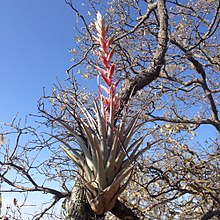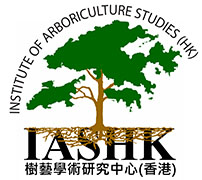nonparasitic plant that uses another plant as a host for mechanical support. but does not derive nutrients or water from it (contrast with parasite and saprophyte).
An epiphyte is a plant or plant-like organism that grows on the surface of another plant and derives its moisture and nutrients from the air, rain, water (in marine environments) or from debris accumulating around it. The plants on which epiphytes grow are called phorophytes. Epiphytes take part in nutrient cycles and add to both the diversity and biomass of the ecosystem in which they occur, like any other organism. They are an important source of food for many species. Typically, the older parts of a plant will have more epiphytes growing on them. Epiphytes differ from parasites in that they grow on other plants for physical support and do not necessarily affect the host negatively. An organism that grows on another organism that is not a plant may be called an epibiont. Epiphytes are usually found in the temperate zone (e.g., many mosses, liverworts, lichens, and algae) or in the tropics (e.g., many ferns, cacti, orchids, and bromeliads). Epiphyte species make good houseplants due to their minimal water and soil requirements. Epiphytes provide a rich and diverse habitat for other organisms including animals, fungi, bacteria, and myxomycetes.

Epiphyte is one of the subdivisions of the Raunkiær system. The term epiphytic derives from the Greek epi- (meaning 'upon') and phyton (meaning 'plant'). Epiphytic plants are sometimes called "air plants" because they do not root in soil. However, that term is inaccurate, as there are many aquatic species of algae that are epiphytes on other aquatic plants (seaweeds or aquatic angiosperms).
